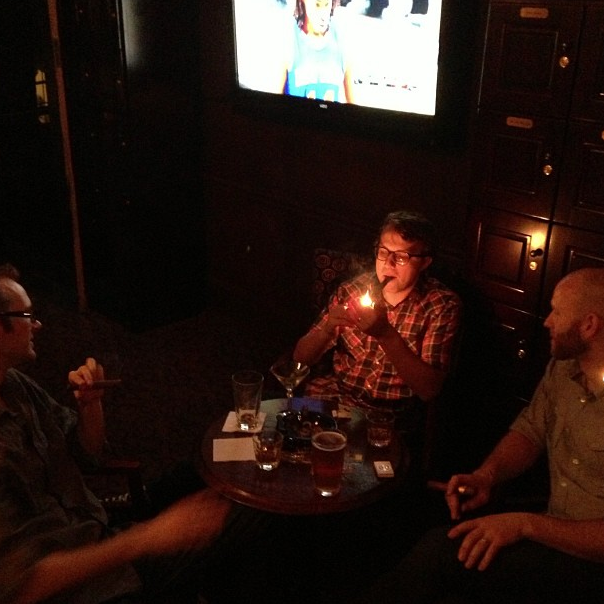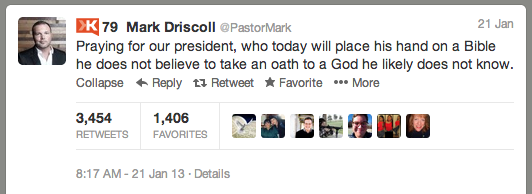This will be the first in, I’m sure, a plethora of posts about the inaugural Missio Alliance Gathering in D.C. that came to a close yesterday.
It was simply an epic time. One of the many highlights occurred Thursday evening as a group of us got together at a local cigar lounge in old town Alexandria, Va. We all ended up staying past midnight – it was just that good. And toward the end I found myself in a conversation (listening, mostly) with Jared Byas, A.J. Swoboda, and Geoff Holsclaw, in which there were moments of tweetable brilliance and an underlying sense of the discerning Spirit’s presence and work.
This was not a debate, but (forgive the Christian culture cliche) iron was definitely sharpened. There were angles, facets, experiences, and laserbeam convictions talking into and out of and against and underneath and finally with each other until some prismatic perspectives began to appear. One of those perspectives was indeed tweetable:
Sidenote: A.J. meant to attribute this line to Geoff Holsclaw :).
The topic of enemies came up because of the topic of inclusion: Was Jesus really all about being inclusive? Do the Gospels really describe the same sensibility toward including everybody that our culture holds in such high esteem? It would seem that he extended relationship and friendship to everyone (and especially those on the margins), but he also preached a particular call into a particular way of belief and life, and not everyone was able to enter through the gate. And Jesus was willing for some, like the rich young ruler, to walk away sad.
He was even willing to make enemies.
But, there was another angle here, a strong conviction: At what point can we really make an absolute claim to the way of Jesus? That is, are we so sure in our understanding of his way that the boundaries are clearly drawn, and the outsiders clearly defined? As Christians we might rightly say that Jesus presents an exclusive way of belief and life, but he includes whomever he desires, and we don’t know for sure who he’s including or not, right? Thus, a rule or boundary based approach is contrary to the gracious gospel which does not even emphasize a rationalistic belief as a rule, but rather is drawing all into the imminent experience of the Spirit’s reconciling work because of the resurrected Christ – no matter what their belief may be at any given moment, not to mention their chosen “lifestyle.”
The conversation didn’t end there, but let me fast-forward for just a second.
All of us who attended the workshop on sexuality led by Deb Hirsch and Dave Fitch the next day were surprised by the little skirmish that broke out at the very end. Deb had talked about the structure at her church, Tribe L.A., which she described as a “centered set” – anyone and everyone can play or participate in the community as “members” regardless of their belief or lifestyle (a Buddhist even led communion!), but Jesus is at the center, and with him, a core leadership that agrees on an orthodox understanding of scripture and christology. Thus, not everyone can become a core leader, though everyone may participate as a true member. This was in contrast to a “bounded set” approach that clearly marks out what a participant and member looks like in terms of beliefs and lifestyle, and keeps insiders in and outsiders out (who, in this conversation, are those who don’t agree with an orthodox view of sexuality).
A gentleman in the audience wasn’t happy with that description and felt that the centered set was still really a bounded set unless the church would include anyone and everyone as a core leader, no matter their belief or lifestyle. And he let everyone know how unhappy he was…
Back to the lounge.
Some fervent pushback based on real life experience appeared: We don’t have any right to go outside the bounds of the creedal Christian tradition in leading a church community as pastors! We are bound to that tradition, even from a postmodern point of view: that is the perspective or bias we bring to the text and to the ministry, and it’s useless to place ourselves above or outside of that perspective. On top of that, our only job is give witness to the gospel and call people to the real, historic way of Jesus till the day we die! This is what the addict in our community needs – hope of concrete rescue and restoration by believing in Jesus! Some folks won’t like it, but if we are preaching this in relationship and friendship with all (and especially those on the margins), and welcoming them in grace, giving them a place at the table to taste and see that the Lord is good and participate fully in the community, isn’t that the inclusion that Jesus was demonstrating?
Still another laserbeam shone: Don’t you think that all of this sometimes misses what God is doing among us? We are so concerned about means for inclusion or exclusion that we don’t make room for what the Spirit is actually doing in the community as we submit to the Lordship of Jesus. Both demands for rational belief and a disdain for rational belief miss that the Spirit himself is the one who builds the spiritual house and holistically ministers restoration and reconciliation to those open to his work. And this has be discerned collectively by the church on mission.
My only contribution came at this point, and I’m not sure if I made any sense (but hopefully I did): I wonder if this really culminates in something outside the usual inclusion/exclusion conversation and changes the game somewhat. I wonder if this is really about the integrity of Jesus himself. That is, is our conversation lacking a commitment to his integrity – his own integrated life, ministry, word, and work? Clearly, we are leaning on the tradition for some of that, on a sense of orthodoxy; but we are also leaning on history, on a sense that we really can know things about Jesus that we need to know. Does this lead to idolatrous certainty? I don’t think so. It’s chastened. It admits bias. And it doesn’t prize rationalistic belief as the golden rule to obey, but sees the integrated Christ himself, by the Spirit, doing the holistic work of reconciliation in and through the church on mission.
And yes, some walk away sad or become enemies, even as Jesus maintains his integrity.
Amirite? Could this be a way beyond the inclusive/exclusive divide? Let me know what you think!
Another sidenote: I was reminded of the importance of history itself when I got a chance to take the Metro to D.C. Saturday and visit the Smithsonian for a couple hours. At the Freer Gallery, the Cyrus Cylinder was on display: the actual engraved decree from King Cyrus to allow the Israelites to return to Jerusalem to rebuild the temple and city. Photos weren’t allowed, but I sneaked this one in. Reminds me of the brilliant center of a “centered set.”














